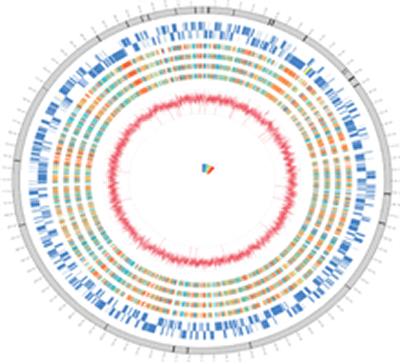Alan Radford
Alan tells us about his Golden-Jubilee grant which was used to sequence 50 new genomes from pathogens of veterinary importance, one for each year of the RCVS trust (in actual fact, over 50 were sequenced!)
So called “next-generation” sequencing is revolutionising almost all areas of biology. It represents a real quantitative step-change in the quantity of science that can be performed and has been rapidly introduced to the scientific community in the last five years. Prior to next generation sequencing, a typical scientist could determine the sequence of ~1000 bases of genetic information a day. Following the arrival of next generation sequencing, that same scientist had the potential to generate 100,000,000 bases of genetic information in the same time period.
This unparalled throughput, allied with an almost equivalent reduction in the cost of sequencing, has brought with it the possibility of sequencing the entire genome of everything – literally. We are now entering an era where the sequence of a human genome would cost ~£1000, and iPhone now have plans to build an app to hold this data!
As is often the case, the arrival of new technology brings with it new challenges, and for next generation sequencing, that challenge is how to capture, manipulate, interpret, and present the huge amounts of data generated. This discipline – so called bioinformatics - is at the heart of success for any next generation sequencing project.
Our application for funding for this project was made at a time when next generation sequencing was just becoming available to the scientific community, and at a time when Liverpool University had already invested heavily in the necessary infrastructure, an investment that is today called the Centre for Genomic Research.
The philosophy of the bid was simple, namely to make available next generation sequencing, with bioinformatic support and training, to the scientific veterinary community in the UK. Funding was used to pay for sequencing, and to pay for a senior bioinformatician to help analyse the data.
As a result of RCVS Knowledge funding, we established VETseq, a collaboration between the Veterinary School and the Centre for Genomic Research at University of Liverpool.
“RCVS Knowledge support for this project has provided a route for many scientists across the UK... to get access to the latest state of the art technology, as well as highly trained computer scientists specialising in analysing DNA sequences. This resource has revolutionised the opportunities available to such scientists, and allowed for a radical step-change in the quantity and quality of data they can produce. The value of this resource will be continually felt for many years to come, as the sequences generated with RCVS Knowledge funding are made available on public databases to the widest scientific community.”
Key facts about the project
- The project started in August 2008, and finished in June 2011
- A highly qualified postdoctoral bioinformatician was recruited to the main post in this project -Dr Alistair Darby
- The final genomes chosen come from a total of 10 universities / institutes in the UK, on projects led by 24 different academics. They include
- 75 bacteria
- 16 viruses
- 3 macroparasites
- A total of approximately 90 million bases of sequence has been obtained
- We have run a two day computer training workshop for 18 scientists from six institutes in October 2009
- To mark the end of the project, a symposium was held at Belgravia House. The programme for the event and further details including the presentations are available.

Image: 1.2 million bases funded by RCVS Knowledge. The genome of Wolbachia pipientis - kindly provided by Ben Makepeace